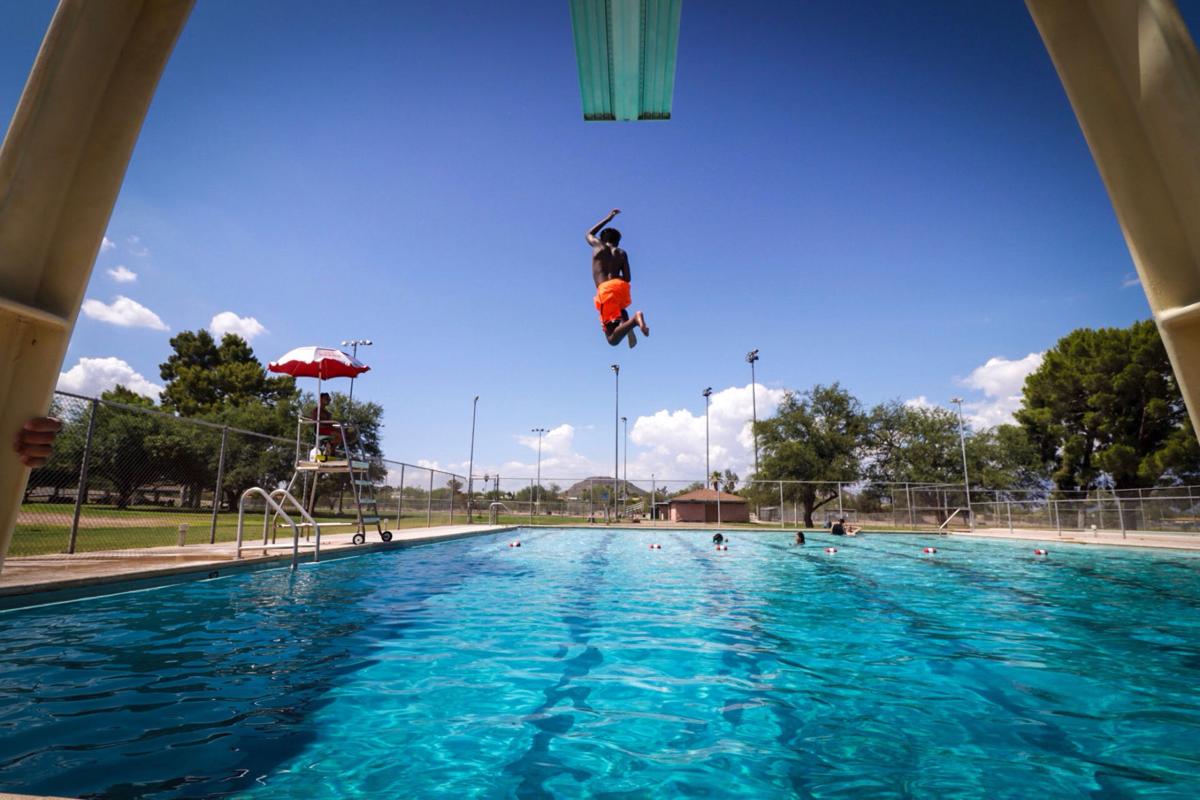The more than 20 public pools in Pima County and the city of Tucson have fared well in safety inspections this summer, according to officials and county health department reports.
There have been about 100 public pool inspections so far in 2017, with each public facility receiving at least one visit, and just six inspections have resulted in a failed rating. Most of those had to do with fences, gates, railings and other structural issues, and just two stemmed from water-quality issues, which were resolved.
Since 2015, there have been nearly 500 visits and 16 failed health inspections at public pools, according to records provided to the Star through a public-records request.
One of the facilities to fail this year for water-quality issues was the Kennedy Park pool, where disinfectant concentrations were below established levels during a June 9 inspection. The county inspector also found there were loose handrails and no ring buoy on site, according to the inspection report.
Billy Sassi, aquatics program manager at the city of Tucson, said all issues at the Kennedy facility were resolved the same day. The low disinfectant level was related to an automatic disinfectant feeder, which was reset, the handrails were fixed and there is now a buoy.
The water in the therapy pool at the Edith Ball Adaptive Recreation Center was cloudy when inspectors visited in late April, but the facility passed a follow-up inspection several days later. Though it passed, the tile around the main pool had cracks that could be a tripping hazard, and the pool supervisor told the inspector they would be fixed.
Most recently, the Ajo Pool in Ajo failed an inspection June 28 for a gate that didn’t properly self-close and latch. The health code requires pools to have a gate that swings backward and locks into place after each person walks through. In this case, the gate in question was not used by the public to access or leave the pool.
The gate is now in compliance, and additional gates that were deemed by the county’s risk management department as not being up to code will remain locked, used only for utility purposes by the pool’s staff.
“If there is something, we immediately follow the health code and work to get it addressed,” said Grant Bourguet, recreation program manager at Pima County.
“While we are working with the health department to get this little issue addressed, there’s not an urgent fear that somebody could pull on that gate and walk to the pool, fall in and drown,” he said. “It’s a covered, lifeguard-facilitated pool.”
Several other pools received violations for fencing and gate issues, including the Menlo Pool, 1060 W. Fresno St., and Archer Center, 1665 S. La Cholla Blvd.
On June 26, an inspector found the Menlo Pool had a gate that didn’t self-latch, as well as holes in different parts of the exterior fence. The pool was closed for the day to address the issues, which Sassi said were fixed the same day.
“Our fences have been a fairly big issue, because they keep getting cut,” he said. “Somebody hops the fence or cuts it at night, has a party at the pool, then they will trash it.”
While fencing issues were corrected at both Menlo and Archer Center, Sassi says vandalism is the worst problem facing city of Tucson pools. Along with cut fencing and trash, everything from dog food to cereal has been thrown in the pool. It can take hours to properly clean it, sometimes causing the pool to open late or community programs like swim lessons to be canceled.
“It happens several times over the course of the summer,” Sassi said. “We just had an occurrence at one of our pools this weekend where a bunch of dishwashing detergent was emptied into the pool, and we spent all morning trying to de-suds it.”
Such issues are not new. Sassi said that one of the strangest pool pranks was when someone released 50 goldfish into a public pool about 25 years ago. Sassi said only a few of the fish died, and a local pet store took in the survivors.
Both Pima County and the city of Tucson strive for diligence in ensuring the proper water quality, officials said. Staff members are required to test chlorine or bromine levels and pH at least hourly during business hours. The county health department inspects city and county pools at least once a month during the summer.
Though a few pools have received violations for not meeting water-quality standards, the issues were typically resolved the same day, often involving adjusting the chlorine levels before opening the pool. Bourguet said safety at the pools is ensured through daily procedures, and lifeguards are constantly trained on proper water testing.
Summer-session pools in the city of Tucson will remain open until Aug. 2; Pima County pools will be open until Sept. 4.





